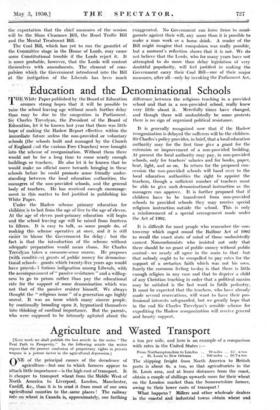Education and the Denominational Schools
9111KWIlite Paper published by. the Board of Education arouses strong hopes that it. will be possible to raise the school leaving age. without much further delay than may be due to the congestion in Parliament. Sir Charles Trevelyan, the President of the Board of Education, let it be known last year that there was little hope of making the Hadow Report effective_ within the immediate future, unless the non-provided or voluntary schools (the schools built and managed by the Church of England z:nd the various Free Churches). were brought into the scheme of reorganization. Without them there would not be for a long time to come nearly enough buildings or teachers. He also let it be known that he would make_ no official move towards bringing in these schools before he could promote some friendly under- standing between: the local , education authorities, the managers of the non-provided schools, and the general body of teaohers. He has received enough encourage- ment in this matter to feel justified in publishing his White Paper.
Under. the Hadow scheme primary education for ChildrenriS to last from the age of live to the age of eleven. At the age Of eleven post-primary education will begin. and the school leaving age will be raised from fourteen to fifteen. It is easy to talk, as some people do, of Making this scheme operative at .once, and it is still 'eaSier to blame the Government for delay ; but the fact is that the introdtiction_ of . the scheme . without adequate Preparation. would mean chaos, Sir Charles Treirefyan takes a . common-sense course. He proposes (With- conditions) grants of public money for denornina- tiOnal schools--grants .which twenty five years ago would haVe pit/Vat d furious indignation among Liberals, with the accOMpaniment of" passive resistance" and a willing- ries IO go- to prison rather than pay the educational ride for the support of some denomination which was not that of . the passive resister himself. We always thought- the "religious issue" of a generation ago highly unreal. It- was an issue which many sincere people, by continually brooding upon it, hypnotized themselves into thinking of cardinal importance. But the parents, Who were supposed to be intensely agitated about the difference .between the religious teaching in a provided school and that .in a non-provided _school, really knew very little about it. Mercifully times have changed, and though there will undoubtedly be some protests there is no sign of organized political resistance.
It is generally recognized now that if the Hadow reorganization is delayed the sufferers will be the children. Sir Charles's policy provides, in brief, that a local education authority May 'for the -first time give a grant for the extension or improvement of a -nen-provided building. At present the local authority may pay, in non-provided • schools, only for teachers' salaries and for books, paper, heat, light, and so on. In return for the proposed con- cession the the non-provided schools will hand over to the local education -authorities the right to appoint the • teachers, though a sufficient number of teachers must be able to give such denominational instruction as the Managers can approve. It is further proposed that if children have to be transferred from non-provided schools to provided schools they may receive special religious instruction outside the school. This is only a reinforcement of a special arrangement made under the Act of 1902.
It is difficult for most people who remember the con, troversy which raged round the Balfour Act of 1602 to recall the exact .state of mind of those. undoubtedly earnest . Nonconformists who insisted not only that there should be no grant of public money. without public control—we nearly all agree in the main to that—but that nobody ought to be compelled to pay rates for the support of a sectarian faith which was not his own. Surely the common feeling to-day is that there is little enough religion in any ease and that to deprive a child of any Christian teaching in order that a political maxim may be satisfied is the last word in futile pedantry. It must be expected that the teachers, who have already made several reservations, will want to have their pro- fessional interests safeguarded, but we greatly hope that in the end Sir Charles Trevelyan's sensible scheme for expediting the Hadow reorganization will receive general and hearty support.














































 Previous page
Previous page